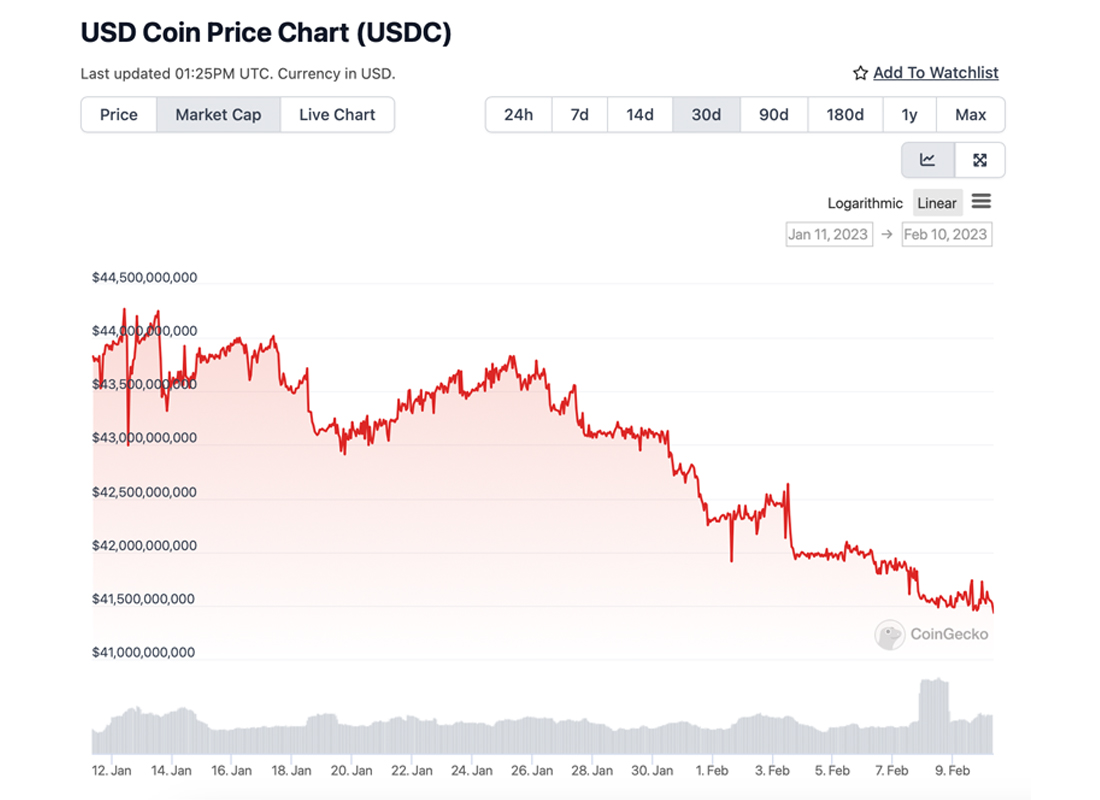
It appears that the circulation of the stablecoin usd coin has decreased while tether’s has grown, as the latest statistics paint a contrasting picture. Tether saw a 3% increase in coins in circulation over the last month, while the U.S. dollar-pegged crypto asset usd coin recorded a decrease of approximately 4.9% in the same time frame. From Jan. 6, 2023, to Feb. 10, approximately $2.196 billion worth of usd coin was redeemed over the past month.
Monitoring the Stablecoin Economy’s Recent Moves Amid 2023’s Regulatory Crackdown
According to current statistics, the entire stablecoin market capitalization lost $625,009,636 in value from Jan. 6, 2023, up until today. A significant portion of the losses can be attributed to the second largest stablecoin by market capitalization, usd coin (USDC).
Data shows that USDC decreased by 4.9% in approximately 30 days, resulting in a loss of 2.196 billion in overall valuation since Jan. 6. Conversely, Tether saw a 3% increase, mitigating some of USDC’s losses in terms of the overall market capitalization of the entire stablecoin economy.

The third largest stablecoin by market valuation BUSD, has shed 0.5% over the last 30 days. Statistics recorded on Jan. 6 indicate that BUSD’s market cap was around $16.79 billion and today, the current market capitalization is around $16.19 billion.
The rest of the dominant stablecoins in the top ten standings saw 30-day increases in terms of coins in circulation including DAI, FRAX, TUSD, USDP, USDD, and GUSD. Tron’s USDD jumped 1.3% higher, USDP increased by 3.3%, and TUSD’s number of coins in circulation over the last month swelled by 11.9%.
As of now, the stablecoin economy represents approximately 12.9% of the total crypto economy, and its trade volume accounts for 81.4% of the overall cryptocurrency trade volume. The data suggests roughly 8 out of every 10 trades across the crypto market are conducted using a stablecoin.
Stablecoins have been a part of the cryptocurrency economy for some time, and the dollar-pegged tokens have recently benefited from the crypto economy’s 5% decline after the U.S. Securities and Exchange Commission (SEC) sanctioned Kraken for its staking service.
The future of the stablecoin market and individual stablecoins within it is uncertain, but with ongoing regulatory challenges and trends, it is worth paying attention to. Stablecoins have long dominated in terms of trade volume, but only recently have the number of coins in circulation declined significantly.
What do you think about stablecoin market action lately and the decrease of dollar-pegged coins in circulation? Share your thoughts about this subject in the comments section below.
Image Credits: Shutterstock, Pixabay, Wiki Commons
Disclaimer: This article is for informational purposes only. It is not a direct offer or solicitation of an offer to buy or sell, or a recommendation or endorsement of any products, services, or companies. Bitcoin.com does not provide investment, tax, legal, or accounting advice. Neither the company nor the author is responsible, directly or indirectly, for any damage or loss caused or alleged to be caused by or in connection with the use of or reliance on any content, goods or services mentioned in this article.







